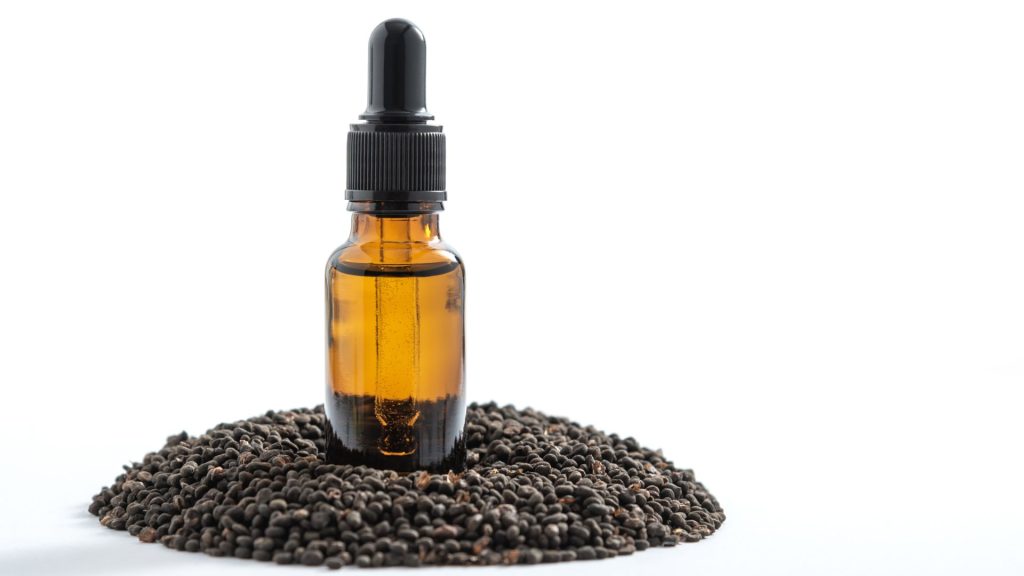Bakuchiol is an antioxidant found in serums and creams derived from plants, with proven anti-aging, anti-inflammatory, and antibacterial properties.
This natural ingredient acts like retinol by increasing cell turnover and stimulating collagen production, as well as helping minimize fine lines and wrinkles as well as increasing skin elasticity.
Anti-aging
Bakuchiol, extracted from the seeds of Psoralea corylifolia plant (commonly referred to as “babchi”), functions similarly to retinoids in that it increases cell turnover by stimulating collagen production, leading to decreased fine lines, wrinkles, skin laxity, and overall photodamage. Furthermore, its anti-inflammatory and antioxidant properties make it an excellent way of alleviating redness, hyperpigmentation, or uneven skin tone issues.
Krupa Koestline, founder of KKT Consulting and frequent mindbodygreen contributor, highlights bakuchiol as having many benefits for skin health, including decreasing signs of aging, evening out uneven skin tone, increasing hydration levels, and helping calm inflammation. For maximum effect she suggests pairing it with other ingredients to maximize its efficacy.
That is why it blends so well with ingredients like salicylic acid, niacinamide and peptides, according to her. Additionally, because it’s non-vitamin A related, it’s less irritating and ideal for sensitive skin conditions.
Anti-inflammatory
Bakuchiol is an anti-inflammatory ingredient that can soothe and calm the complexion, as well as fade dark spots, pigmentation and acne scars for an even-looking skin tone. As a gentler alternative to vitamin A retinol treatments it may also be ideal for those who cannot tolerate its harsher formulation.
Studies published in 2021 demonstrated that treatment with bakuchiol had significant results for decreasing levels of proinflammatory cytokines (IL-1, IL-6, IL-8 and TNF-a) as well as congested bronchial tubes in pneumonia mice. Furthermore, this treatment significantly enhanced their antioxidant status with higher SOD concentrations and lower MDA levels.
As with retinol, bakuchiol may initially cause skin sensitivity or redness when first introduced; for this reason it’s recommended to take it slowly by starting small and adding only small doses into your routine at first and seeing how your skin responds. Also beneficial are combinations with Hyaluronic Acid and Vitamin C.
Anti-bacterial
Bakuchiol may help skin recover from breakouts. According to one study, topical 0.5 percent bakuchiol cream significantly decreased inflammatory acne lesions while also diminishing any discoloration left behind, suggesting this ingredient might be effective against mild to moderate acne (though more research needs to be conducted).
As with other skincare ingredients, the way your skin reacts to bakuchiol will depend on several factors. It’s best to combine its use with other active ingredients; just be aware that certain medications and conditions could interact with it.
Bakuchiol, a vegan skincare ingredient gaining increasing recognition among beauty insiders, is garnering great interest among beauty experts. Derived from seeds of Psoralea corylifolia plant (commonly referred to as “babchi”), it reportedly offers all the same benefits of retinol without its adverse side effects such as dryness or irritation.
Anti-oxidant
Bakuchiol’s antioxidant properties enable it to eliminate free radicals – unstable molecules which damage skin cells and contribute to premature aging – by neutralising them, helping reduce dark spots and uneven skin tone while simultaneously stimulating cell turnover and collagen production – further contributing to decreased fine lines, wrinkles and overall photodamage.
One study demonstrated that bakuchiol could also be effective against the growth of melanoma cells. It has been demonstrated to increase their susceptibility to TRAIL, an important cell death pathway, while increasing expression of pro-apoptotic proteins such as PARP and cleaved caspases while simultaneously suppressing survival proteins cFLIP and survivin.
As it is a relatively new ingredient, it’s always wise to seek advice from a dermatologist before adding new skincare ingredients into your routine. That being said, bakuchiol seems safe for all skin types and works well with most other skincare products such as vitamin C serums, oils, face masks and moisturizers.


